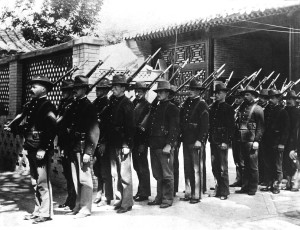Continue reading Virginia Bolten
Virginia Bolten
Continue reading Virginia Bolten
Our comrades are perfectly right to say [in their letter] that the May strikes are a consequence of general economic conditions. If the return of work to the mines and in the iron industry, and if dreadful poverty in the other trades did not exist, there wouldn’t have been any strikes at all, as there weren’t any on such a large scale ten years ago. But what our comrades ignore is that, outside all socialist organisations, right now, within the workers of all nationalities, an immense work to press on to a general strike is taking place.
Continue reading The Action of the Masses and the Individual

Nuestros compañeros están perfectamente en lo correcto al decir [en su carta] que las huelgas de Mayo son consecuencia de las condiciones económicas generales. Si la vuelta al trabajo en las minas y en la industria del hierro, y si la pobreza espantosa en otros oficios no existiese, no habría huelga alguna, así como no las había a tan gran escala diez años atrás. Pero lo que ignoran nuestros compañeros es que, fuera de todas las organizaciones socialistas, ahora mismo, en los trabajadores de todas las nacionalidades, se está desarrollando una inmensa labor por avanzar hacia una huelga general.
Continue reading La acción de las masas y la acción individual – Piotr Kropotkin
Voltairine de Cleyre (1890)
¡Noche en la cárcel! ¡Una silla, una mesa, un pequeño lavabo, cuatro paredes vacías, fantasmagóricas a la tenue luz del pasillo de fuera, una ventana estrecha, con barrotes y tapiada, una puerta chirriante! Tras la temible celosía de hierro, entre las paredes — ¡un hombre! Un hombre anciano, arrugado y con el cabello gris, cojo y doliente. Ahí se sienta, en su gran soledad, aislado del resto del planeta.
Continue reading Esclavitud sexual
El siguiente texto fue publicado en 2014 en la región chilena por la editorial Mar y Tierra. Constituye un repaso del movimiento anarquista en el territorio que habitamos. Su aporte consiste en generar un recorrido por las ideas y prácticas ácratas de forma resumida y concisa. Sin duda una oportunidad para redescubrir el pasado y el presente de uno de los movimientos emancipatorios que históricamente ha tenido un importante protagonismo en la región chilena.
Continue reading Anarquismo en Chile. Una síntesis histórica desde 1890 hasta nuestros días

Exact Date Shot Unknown
NARA FILE #: 127-N-515634
WAR & CONFLICT BOOK #: 327
by Samuel Williams Cooper
There has been much discussion concerning the abuse of personal liberty and private property from the exercise of extraordinary rights retained by the government for the protection of the public. Quarantine regulations, and license or prohibitory laws, where the state assumes full control of the individual and the destruction of his effects for the safety of society, may be cited as instances of the evil.
Our comrades are perfectly right to say [in their letter] that the May strikes are a consequence of general economic conditions. If the return of work to the mines and in the iron industry, and if dreadful poverty in the other trades did not exist, there wouldn’t have been any strikes at all, as there weren’t any on such a large scale ten years ago. But what our comrades ignore is that, outside all socialist organisations, right now, within the workers of all nationalities, an immense work to press on to a general strike is taking place. Democrats, trade unionists, socialists, anarchists, have absolutely nothing to do with it. – “We are overwhelmed by this movement” we were told, two years ago, by a Belgian socialist. In England, in a big city, at least socialists took hold of this movement. They were well received at first; but when people realised that they wanted to enlist it to an electoral aim, they threw them overboard.<a id="fn_back1" class="footnote"
Continue reading The Action of the Masses and the Individual

The very corner-stone of Anarchistic philosophy is often supposed to be a paraphrase of Herbert Spencer’s “First Principle” of equal freedom, that: “Every person has a natural right to do what he wills, provided that in the doing thereof he infringes not the equal rights of any other person.” Yet there lurks in the expression a fallacy that correct thought must repudiate, or we must carry with us a diagram explaining the meaning of the words we use.
Our comrades are perfectly right to say [in their letter] that the May strikes are a consequence of general economic conditions. If the return of work to the mines and in the iron industry, and if dreadful poverty in the other trades did not exist, there wouldn’t have been any strikes at all, as there weren’t any on such a large scale ten years ago.
Continue reading The Action of the Masses and the Individual
Desde los orígenes del movimiento obrero y popular en la región chilena, los trabajadores del sector portuario estuvieron entre los más activos, combativos y mejor organizados.
Continue reading Breve reseña de las organizaciones y luchas del sindicalismo portuario en la región chilena (1890-1930)